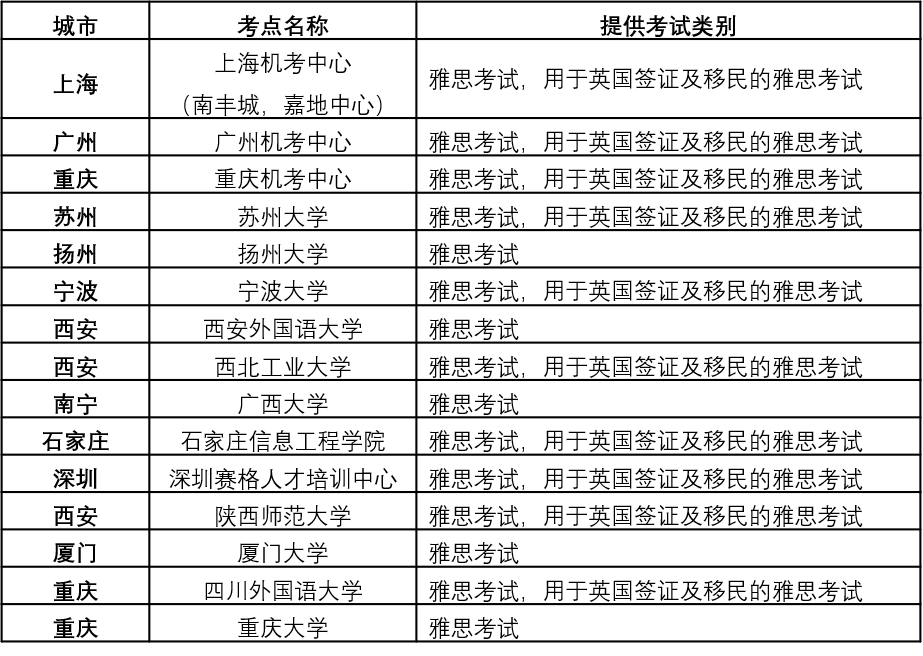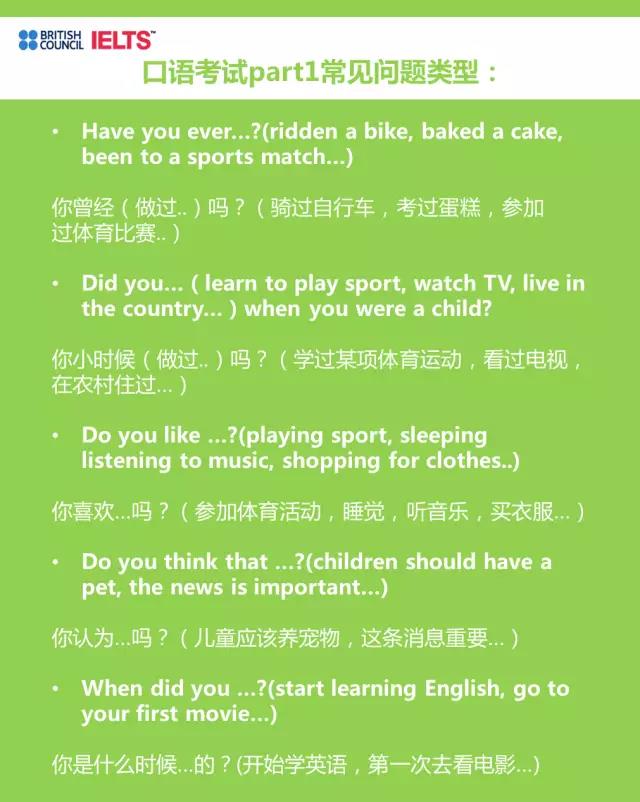8个雅思口语考试时千万不能说的表达,来自雅思口语考官的诚意分享。下面小编就和大家分享 雅思口语考试别说这些话,来欣赏一下吧。
雅思口语考试别说这些话
为了更方便大家查看,今天把这8个内容全部整理到了一篇里面,看过的同学也可以温故而知新。在雅思口语考试中,有一些中国考生用的语句虽然不一定是错误的,但听在雅思考官耳里却是很刺耳的。有的体现在太多雅思考生用那些只有很少母英语语人才会用的语句;有的则是正确的单词被使用于不对的上下文。如果你不想招你的考官烦的话,最好避免用这些说法。即使你不考雅思,也可以学学更地道的表达方式。在雅思考试中最好别说这些话
雅思口语错误表达:01to develop one's logical thinking /critical thinking
好多考生在回答'你为什么选择这个专业?'或者'你喜欢你的专业吗?'这样的问题时会说:他们选这个专业的理由是:'这个专业能发展自己的逻辑思维和批判性思维'。当这句话被翻译成英语的:"I chose this course because I wanted to develop my logical thinking and critical thinking"不仅听起来很奇怪,还会由于被太多考生使用,而令考官感觉很刺耳。另外这也好像不是一个特别诚实的答案。年轻的中国人要决定去哪所大学时必须要考虑到一些事情:他们要想自己对什么专业感兴趣,哪个专业是他们父母想让他们学的,哪个专业会帮他们毕业后找到一份好工作,他们也要估计自己的高考分数,然后猜他们的分数会允许他们申请哪所大学和学哪个专业。很少很少准备高考的学生在决定申请哪些大学的哪些专业时真的会问自己:'哪个专业会发展我的逻辑思维和批判性思维?不是嘛?
如何回答关于你为什么选了你的专业的问题?
我的建议:别说屁话就好!是你自己选还是你父母逼你选的专业?是你的首选还是因为高考分数很低没有其他选择。不要想太多,说实话就好。考官很喜欢听考生告诉他们真正的答案。
雅思口语错误表达02:乱用Cultivate
中国的雅思考生很喜欢这个词,不过很少有能正确使用'cultivate'的。在英语我们用这个词谈论植物,蔬菜和水果。在那种情况下:' to cultivate'的意思就像是'to grow'。正如我们可以说:'to grow plants/vegetables/fruit',我们也可以说:'to cultivate plants/vegetables/fruit'。但我们不可以说的是:'tocultivate children'或者 'to cultivate pets'。英语有几个表示'培养孩子'这句话的意思,取决于不同情况。
我们可以说'to educate children','to teach children things'或者 'to raise children'。
谈论动物和宠物时,
我们可以说'to breed animals'(繁殖动物)或者'to raise/ look after/ take care of pets' (养宠物)。
另一个正确使用'cultivate'的方法是:'to cultivate a sense of something'.如'to cultivate a sense of responsibility/belonging/ awareness 等等。(培养责任感 / 归属感/ 意识)不过虽然这个说法是正确的,但我还是推荐你最好别用!就像之前提到过的'with the development of....',太多考生过于频繁的使用这句话,而且往往用在不正确的上下文。如何表示'培养什么什么感觉'?当志愿者可以培养年轻人的责任感。
Doing volunteer work can make young people more responsible.
一位好的领导会培养人员的归属感。
A good leader can make their staff feel like they belong.
雅思口语错误表达03 I have been working for / I have already worked
当已经上班的中国人被问“你是一个学生还是已经工作了?”时,他们会回答说:“我已经上班___年了”。当在英语里被问这个问题:“Do you work or are you a student?"时,他们很多都会把那句:“我已经上班___年?”直接翻译到英语说:"I have already worked for ____ years."这个回答的意思是:"我之前上班了__年,”所以这就意味着那个人现在不上班。因此,他们实际想表示的是:“I have been working for ____ years".这个答案比较好一点,不过还不是正确的答案。已经上班的母语人被问到:"Do you work or are you a student?”时,一般来说,他们不会回答说他们上班了多久。他们只会说:“I work."或者"I work, I'm a doctor"等等。他们被问到:
"How long have you been working for?”(你已经上班了多久?)才会提到自己上班了多少年。
JOHN的提醒:你的考官也许不会特别在乎这个他可能已听过太多中国考生犯的错误,但是如果你想让他知道你比普通考生厉害一点的话,
最好像母语人一样简单的回答说:"I work!"
雅思口语错误表达04Delicious food
'Delicious' 是一个很好的单词,在正确情况下偶尔用'delicious'没什么不好。我估计我大概每月一次会用到这个形容词。但一些英语学生的问题是:这是他们唯一会用来形容食物的单词。无论他们想表达好吃、美味、可口、香喷喷或者味道不错的食物时,他们总是用这个在小学就认识了的老朋友——delicious。他们从不会单独的用'food'这个单词,而是每次在'food'前面使用那个快要“过劳死”的'delicious'。
我建议你在雅思考试的那天,最好让这位老朋友休息一下,考虑用下面这些英语母语人经常用到的词:good food, nice food,tasty food, great food,scrumptious food。甚至有时候,我们没必要前面一定加一个形容词,简单的说'food'就可以了。那我们该如何谈论食物?那家餐馆的火锅很美味。The ho官方真题Officialt at that restaurant is very tasty.日本料理蛮好吃。Japanese food is great.我喜欢烹饪美食。I enjoy cooking.
雅思口语错误表达05 to broaden one's horizons
重要的事情说三遍:
这句话被中国雅思考生说的太频繁!这句话被中国雅思考生说的太频繁!这句话被中国雅思考生说的太频繁!如果你一个人去了非洲,在一个没电没水的农村呆了几年,在那边跟本地人沟通,学他们的语言,在他们的农田帮助他们干活,跟他们的孩子玩耍等等。
那你可以说那个经历真的"broadened your horizons"。
大家要注意的是:普通的去泰国旅游的经历,从安徽搬到江苏,在微信跟外国人交流都不能算。我的重点是:除非你在谈论一个独一无二,真真正正完全会改变人生的事情,否则最好不要用'to broaden one's horizons'这个说法。对了,虽然中文里有“大开眼界”这样的表达,但英文没有' to broaden one's eyes'的说法,这也是有些考生在考试中会用的错误句子。下面是些用英文表述"大开眼界"的栗子我看的纪录片让我扩大了眼界。
The documentaries I watch help me to know more about the world.
我想去美国为了打开自己的眼界。
I'd like to go to America because I want to see more of the world.
学英语帮了我扩大眼界。
Studying English has helped me to understand the world better.
雅思口语错误表达06 balcony
就像'French windows'一样,
'balcony'(阳台)是另一个很多考生以为被问到关于他们房间的问题时必须要使用的词。好多考生会冗长复杂地描述他们的阳台。然而绝大部分考官已经听到太多关于阳台的背诵答案。而且因为考官也知道并没有那么多中国年轻人都住在有阳台的房间。他们一听到另外一个人又很夸张的描述他们房间的阳台时,就会认为这个人也在背诵答案,而背诵答案是最最招惹考官厌烦的事情!!如何描述自己的房间?最好不要很详尽地回答这类考试第一部分的问题。千万不要考试前背这些简单问题的答案。如果为了回答"What's your favorite room in your home?(你最喜欢你家的那一间房间?)
类似的问题,你需要花很多时间背答案的话,
那就意味着你英语当时不够好。最好先用几个月专心练习用英语交流。经过几个月的高效口语练习后,你会觉得这样的雅思口语第一部分问题很容易,到时候就能很自然清楚地回答。
雅思口语错误表达07 French Windows
几年前,我不知道究竟是谁,也不知道是在哪里,也许是一个培训机构,一本课本或者一个网站。学生在雅思口语考试被问到关于你房间时,最好不要用'windows'(窗户)那个普通、无聊的单词,而是用'French windows'(法式窗户/落地窗)。"仿佛一听到那个超高级的魔法单词,你的考官就会觉得:你是一位非常了不起的、值得9分的考生!我还记得当时在两三天之内,突然听到很多考生用那个单词。
我不得不谷歌一下TMD的'French windows'到底是什么东西!(基本上是一个有很多玻璃的门)。从此以后,我至少听到好几百个考生在提到他们房间里的'French windows'。不过事实上,在中国很多年,我很少看到过那样的东西。那究竟该如何表达这类话的意思?请看下面的栗子!关于你房间的问题应该只会在考试第一部分出现。你不需要浪费时间过于仔细地描述你的房间。如果你想谈到窗户的话,你不妨描述一下
你从窗户可以看到的东西,比如:"I can see a river from the window of my room." / "My room looks out onto a river."
雅思口语错误表达08 With the development of science and technology / society / the economy / industry etc
在国内看新闻或者关于政经的书时,我们经常看到'随着_____的发展'那句话。
那句话翻译成'with the development of __'虽然没错,但问题是:英语母语人几乎从来不会用那句话。我在生活中听过好多关于政治,经济和社会的广播,我也跟很多朋友谈过那些事情,不过我好像从没听过任何母语人用'with the development of science and technology/ society/ the economy那句话。
然后在中国,只要当了一个上午的雅思口语考官,我平均来说会听到它10次!!母语人偶尔会用'With the development of the internet'这句话,但它在英语中的出现率比中文中少多了!你可能会认为这应该不是一个特别严重的问题,我们大部分外语学生有时候会把自己母语的一句话直译成外语,但问题是:太多太多中国考生都会用这个说法,而且会把它滥用到各种问题的回答中。那究竟该如何表达这类话的意思?
请看下面的栗子!
随着社会的发展,我们的生活压力很大。
- As (the) society has gotten richer our lives have become more stressful.
随着科技发展,跟世界各地的人交流很容易。
- Now that we have lots of new technology it's very easy to contact people from all over the world.
随着经济的发展,很多人可以出国旅游。
- As the country has gotten richer, it has become possible for lots of people to take foreign holidays.
2020年9-12月雅思口语part2&3答案解析:一个好的决定
Describe a good decision you made recently.
You should say:
When it happened
Why you made this decision
What the decision was
And explain how you felt about it
A good decision I made very recently was the decision to go with my friends on a hike in the fragrant hills, just outside Beijing. I was not sure if I wanted to go because I am not really used to walking or hiking and things like this, so I was wavering in making the decision. But in the end they convinced me it would be fun, so I decided to go. Actually I asked my father about it and immediately he told me “Yes, of course, you should go! You’re always sitting around the house playing games on your phone. It would do you good to get out and exercise and get some fresh air outside of the city!” So, I decided I would join them. We set off about 6am from near where I live, in a hired minibus, and I took a backpack with a picnic, of sorts, and some drinks and things like this. It took a few hours to get there, and the journey was really quite pleasant. When we got out of the city we could see the vast countryside on all sides, and gradually the mountains came into view in the distance. I had a nap for a while, and then we were there! We got out and started to walk along a quite well-known trail that lead up into the hills. It was a fairly easy walk, and there were stone steps along the way too, so it wasn’t exactly a grueling mountain track in the middle of nowhere. A lot of countryside sites have been quite commercialized in my country over the years, and there are usually quite a few other visitors and tourists there too, so there are facilities along the way to cater for such people. I, honestly, would have preferred it if it were quieter – you can’t seem to get away from other tourists in my country and this can be a shame if you just want to spend time with friends and feel like you’re the only people there – just you and nature! Anyway, I did enjoy it, and we reached the top of one of the hills, sat down at a stone table, ate our food and chatted and took photos of the magnificent, panoramic views. I’m very happy I made this decision and that my father nudged me to go – as, otherwise, I would have just sat at home doing the same thing as I always do on the sofa, playing silly games and chatting to friends on my phone. Sometimes it’s good to decide to do something different with your weekend than your usual routine.
Part 3
1. How can parents help children make decisions?
Parents help kids make decisions in all sorts of ways. Mainly because they have more experience of life and a better, broader perspective on things. Parents don’t always help, though, sometimes they can be quite interfering and poke their noses in and try to make decisions for you, rather than guide you by calm and sound advice. It depends on the kind of parents really. I think parents should ideally acts as guides, and give logical advice, rather than push and force kids to do what they say. Also I think it’s important parents give reasons for their opinions, and not just tell you what to do from their positions of authority. Kids need to learn to make decisions by themselves, and parents should be there to help them, rather than force them. At least that’s my view.
2. At what age should children start to make decisions?
It depends on the type of decisions we are talking about. There are some decisions that children simply can’t make themselves, and other decisions which they are more than capable of making. Parents need to have a balanced idea of what things to allow their kids to decide for themselves, and what things to basically tell them to do. So, regarding the age when children can start to make decisions, I’d say that simple decisions can be made around the ages of 3 or 4 – basic things, like what snacks they might like to eat, or whether they’d like to wear one pair of shoes or another – and bigger “life decisions” should be made by parents until children are much older, into their teenage years.
3. What decisions do people make every day?
People on a daily basis make a range of decisions, like what to eat for lunch, what clothes to put on in the morning before going to work – how to do their hair. These decisions are largely based on mood and preference. Some days we simply feel in certain moods and not others for no particular reason. Other decisions might involve what kind of music to listen to, when to go to bed early or late, and which friends to meet for dinner or workmates to have lunch with. These are the kind of everyday decisions that most of us make. Then, there are decisions we need to make in our jobs, depending on projects we are working on and timelines and deadlines and the way we prioritise our working day.
4. Why are some people afraid of making decisions?
Making big decisions can be hard, because life is full of dilemmas – situations in which we are not entirely sure which is the best decision to make, and when the possible outcomes can be both beneficial or quite drastic. It’s tough to make bigger life decisions, like what to study, or which jobs to apply for or who to marry even! These decisions change our lives, so we have to be careful when making them, and, of course, this makes us nervous, afraid and scared, because the decisions are so big and can have such a huge impact on us in the future.
2020年9-12月雅思口语part2&3答案:不喜欢那里播放的音乐
Describe an event you experienced but you didn’t like the music played there.
You should say:
When it happened
Where the event took place
What kind of music it was
And explain why you didn’t like the music
I remember very clearly a time when I went to a live concert, a live gig, and really didn’t like the music. It was a few years ago and my friend had a spare ticket to go to a concert in a place in Beijing called Yugongyishan - at the time it was a famous live music venue, which I think has closed down now. Anyway, it was to see a band called The Subs. I had not heard of the band, but it was a local, and quite well-known, Beijing punk band, apparently. I’d never really heard punk music before, so I was curious about the experience, so I agreed to go along with my friend. The gig started around 9pm and went on really late. There were a couple of other bands that played beforehand, but we missed those and just got there in time for the main band, The Subs. I recall that the whole place had amazing lighting and there were crowds of people near the stage, and a few free tables about half way down the room, where it wasn’t so busy. We stood at one of the tables and ordered some drinks. The band came on, on time, with a girl with bright pink hair as the lead singer – she was short, dressed in ripped jeans and a pink top to match her wild pink hair. She basically shouted, screamed I’d say, down the microphone, and then the guitars and drums kicked in and the place went wild. Basically, it was two full hours of loud, aggressive guitar, pounding drums and this girl leaping around the stage screaming into the microphone. Although a lot of the crowd seemed to love it, including my friend, I simply didn’t enjoy it one little bit – I thought it was crazy. I just don’t like aggressive styles of music like heavy metal or punk, I guess. They don’t really resonate with me – so although I guess I can appreciate why some people are attracted to them, personally, I don’t see the appeal – I found the whole gig nothing but a torture to my ears. After the gig I was massively relieved to be out of the place and away from the piercing noise, the screaming and shouting and the grinding sound of the guitars. I felt that my ears had almost been damaged and they were ringing as I waited for the taxi. My friend tried to explain the rebellious history of punk music and the alternative scene in Beijing, and how cool it was. But, I guess I’m quite a conventional person really – I just didn’t get it – it’s just not my style and not the kind of night out that relaxes or stimulates me. In fact, I was relieved to go home. I’ll never go to a punk concert again, I’m sure of that! I like the lighter, positive, upbeat sound of pop music, the grace of classical music and things like this. I like to see those kind of things live, but not punk or heavy rock music. I’m now very sure of that.
Part3
1. Why do many young people like spending a lot of money for concerts?
Young people are often into fashion and music. They tend to follow trends of bands and fashions that go along with the kind of music they like. It’s common that young people get really passionate about music and sometimes the lead singers, guitarists or key musicians in a band are even role models for young people. I think young people like to express themselves a lot, and when they get to their teenage years they want to show their individual tastes, personalities and also share the same kind of tastes as some of their peers in the same social groups. It’s a time in life where they are becoming adults, in a way, but they don’t have the responsibilities that adults have, so they follow these kinds of expressive things, like popular music or perhaps alternative, more individualistic trends, and they get incredibly emotional about them sometimes. I think it’s a stage of development that can be quite beneficial in a way. So, the result of this is that they will certainly pay money to see their “heroes” on stage and perform live music in front of them.
2. Do you think young people and old people enjoy the same kind of music?
Not really no. Most of the time old people enjoy more traditional styles of music, and younger people like more upbeat, perhaps slightly rebellious types of music – or at least music which is faster, perhaps easier to dance to, be active to, or music that stimulates those kind of moods: the mood for dancing, being highly active and doing things quickly or even rashly. I think that this reflects the stage of development and the energy that young people have. Older people, having been through similar stages in their own youth, tend to get a bit more tired with that kind of thing, and want more relaxing and conventional lives. As a general rule, this is the case anyway. Although, I must say, there are some older people who do keep up with times, follow a lot of modern music, and have a genuine interest in different musical styles – those kinds of people are likely to share the musical interests of their kids and the younger generations in general. So, there are older people, too, who are music enthusiasts and do follow current musical trends, but not so many from my experience.
3. Do you think it is appropriate for old people to go to concerts?
Of course, I think older people can do what they like really. If they want to see a concert, whether it be a modern pop, rock or punk concert, or a classical concert, why shouldn’t they? It’s all a matter of taste really. If they feel like being in those kind of places then I think it’s fine. Naturally, I think most older people wouldn’t really choose to be in the thick crowds of young people in a heavy metal or punk concert, really. They’d usually prefer to see a traditional performance or a calmer, more classical performance in a theatre or so. But, for those older people that do enjoy modern concerts, I can’t see any reason why they shouldn’t go if that is what they’re into!
雅思口语相关文章:
★ 2020年雅思口语题库汇总新题
★ 《老友记》口语笔记第1季:10集
★ 学习资料库
★ 雅思口语Part2攻略
★ 雅思口语备考绝招
★ 雅思口语的DosandDON’Ts详解
★ 雅思口语高分技巧之题目迁移
★ 雅思口语3分~8分距离有多远
★ 雅思口语能力判断依据
★ 雅思口语7分经验分享




